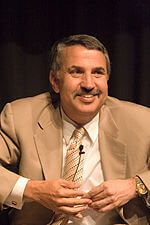 We’re in the midst of the Third Intifada, writes New York Times columnist Thomas Friedman. “But this Third Intifada isn’t really led by Palestinians in Ramallah,” he clarifies. “It’s led by the European Union in Brussels and other opponents of the Israeli occupation of the West Bank across the globe.”
We’re in the midst of the Third Intifada, writes New York Times columnist Thomas Friedman. “But this Third Intifada isn’t really led by Palestinians in Ramallah,” he clarifies. “It’s led by the European Union in Brussels and other opponents of the Israeli occupation of the West Bank across the globe.”
In other words, he writes, the growing trend of European banks and pension funds divesting from Israel is based on “a strategy of making Israelis feel strategically secure but morally insecure,” which could win concessions from Israel.
This formulation might have resonance in some circles if the “other opponents of the Israeli occupation” he refers to were as focused on Israel’s presence in the West Bank as the EU appears to be. But Friedman would be naive to believe the BDS movement – the main “other opponents” – is working towards a two-state solution, or that peace is the endgame of its activity.
Actually, the movement is working for a series of goals, including the flooding of millions of Palestinian refugees to areas inside Israel. As BDS founder Omar Barghouti told the New Republic, the boycott movement would not end if Israel withdrew from the West Bank:
BDS is tied inextricably to the demand for the right of return for the roughly five million Palestinian refugees, most of whom descend from those created in and around 1948. Barghouti confirmed this to me, writing, “The BDS movement upholds the basic rights of all Palestinians, including the right of return.” Or, as he put it in one interview, “‘If the occupation ends, would that end your call for BDS?’ No, it wouldn’t. … The majority of the Palestinian people are not suffering from occupation, they are suffering from denial of their right to come back home.”
So if BDS is fighting for the “right of return” of 5 million Palestinians, that would be a direct assault on the Jewish character of the democratic Israel. In other words, Mr. Friedman, BDS may be non-violent but it still aims for the destruction of Israel as we know it, just like the armed struggles before it. That’s not exactly an expression of “making Israelis feel strategically secure but morally insecure.”
There may well be a Third Intifada underway, but it’s not the one Friedman thinks it is. Just because it’s not bombing buses in Jerusalem does not mean BDS occupies the moral high ground. And that may be why it’s had no effect until the European banks and other more moderate players got involved.
For more information about BDS and how to counter it, visit our Facebook page, Fighting BDS.

